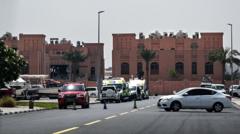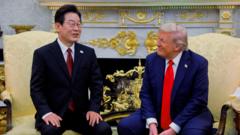Is the Search Still On for Hamas Leaders After Israeli Strikes in Qatar?

Published: 2025-09-11 00:00:29 | Category: technology
The recent Israeli airstrike in Doha, which targeted Hamas leaders, has raised significant concerns and condemnation from various global and regional actors. The strike, aimed at senior members of Hamas, has resulted in casualties and heightened tensions between Israel and Qatar, as well as implications for ongoing hostage negotiations. This incident highlights the complexities of Middle Eastern politics and the precarious nature of ceasefire discussions.
Last updated: 27 October 2023 (BST)
Key Takeaways from the Qatari-Israeli Tensions
- Two individuals remain missing following the Israeli airstrike targeting Hamas leaders.
- The Qatari interior ministry has confirmed the identification of several deceased Hamas members.
- Israeli officials express doubt over the success of the operation, known as "Operation Summit of Fire".
- Qatar's Prime Minister condemned the strike as "state terror".
- International reactions include outrage from other Arab states and criticism from former US President Trump.
Background of the Incident
The airstrike occurred on a Tuesday afternoon in northern Doha, where members of Hamas's political bureau were reportedly gathered to discuss a US proposal aimed at establishing a ceasefire and facilitating the release of hostages. This marked a significant escalation in the ongoing conflict, particularly given that Qatar has been a long-time mediator between Hamas and Israel.
Israeli Prime Minister Benjamin Netanyahu justified the attack, claiming it targeted "terrorist masterminds" responsible for the devastation caused by Hamas during its recent offensive on Israel, which resulted in around 1,200 deaths and numerous hostages taken. In stark contrast, Hamas labelled the airstrike a "heinous crime," asserting that it failed in its primary objective of assassinating its leaders.
Casualties and Missing Individuals
In the aftermath of the airstrike, the Qatari interior ministry confirmed the identification of several bodies, including that of Humam al-Hayya, the son of Hamas's chief negotiator Khalil al-Hayya. The ministry is actively working to identify two individuals still reported missing, with human remains discovered in various locations. However, the fate of Khalil al-Hayya remains uncertain, as there has been no official confirmation regarding his whereabouts.
Israeli Perspectives: Success or Failure?
Initially, Israeli military officials expressed optimism about the airstrike's outcomes, referring to it as "Operation Summit of Fire." However, subsequent reports indicated a growing pessimism regarding its success. Some officials suggested that the intended targets may have been in a different section of the building, raising questions about the overall effectiveness of the operation.
Netanyahu's assertion that the strike was justified is juxtaposed against Hamas's claim that the attack was a failure. The ongoing conflict underscores the complexities of military operations and the difficulty in achieving strategic objectives amidst such high-stakes scenarios.
International and Regional Reactions
The airstrike has drawn widespread criticism from various international leaders and organisations. Qatar's Prime Minister Sheikh Mohammed bin Abdul Rahman Al Thani condemned the attack, labelling it state terror and expressing hope for a unified regional response. He emphasised the need for accountability, stating that it is Netanyahu who should be brought to justice for actions that have resulted in significant civilian suffering.
Former US President Donald Trump also weighed in, expressing dissatisfaction with the unilateral nature of the airstrike within a sovereign nation closely allied with the United States. He noted that the timing of the strike was problematic, particularly given Qatar's role in mediating peace efforts.
In solidarity with Qatar, other Arab states have voiced their outrage. The UAE's President Sheikh Mohammed bin Zayed Al Nahyan visited Doha to express support, while Saudi Arabia's Crown Prince Mohammed bin Salman Al Saud called for action against Israel's "brutal aggression." These developments indicate a growing regional consensus against the Israeli strike and highlight the potential for escalating tensions.
Implications for Hostage Negotiations
One of the most concerning aspects of the airstrike is its potential impact on the ongoing negotiations for hostages held by Hamas. Sheikh Mohammed expressed fears that the attack could jeopardise the already delicate discussions, noting that families of hostages had been relying on the prospect of a ceasefire for their loved ones' safe return. The loss of hope among these families further complicates the humanitarian dimension of the conflict.
Future Actions and Diplomatic Efforts
As the situation continues to unfold, Qatar's government is reportedly reassessing its stance regarding Hamas and its operations within the country. Sheikh Mohammed indicated that discussions with the United States are ongoing, hinting at possible changes in how Qatar approaches its role as a mediator. There are also plans for a summit to discuss a collective regional response, which suggests that diplomatic efforts are still very much in play.
Netanyahu's call for Qatar and other nations to take responsibility for harbouring terrorists has sparked a debate about the role of state actors in conflicts involving non-state groups like Hamas. The dynamics of these relationships are complex, and the consequences of the airstrike may reverberate throughout the region for some time to come.
Conclusion: A Precarious Path Forward
The airstrike in Doha represents a significant escalation in the ongoing conflict between Israel and Hamas, with far-reaching implications for regional stability and humanitarian efforts. As global and regional powers respond to this incident, the need for a coordinated approach to peace and security remains paramount. The evolving situation demands careful monitoring, as the outcomes will undoubtedly shape the future of negotiations and diplomatic relations in the Middle East.
As the world watches, the question remains: can diplomatic efforts survive the fallout from such violent actions, or are we witnessing a turning point in the struggle for peace in the region? #MiddleEastConflict #Qatar #Hamas
FAQs
What triggered the Israeli airstrike in Doha?
The Israeli airstrike was aimed at senior Hamas leaders who were reportedly meeting to discuss a ceasefire proposal and hostage negotiations. It is part of Israel's broader military strategy against Hamas following the group's attack on Israel in October 2023.
How has Qatar reacted to the Israeli airstrike?
Qatar's Prime Minister condemned the airstrike as "state terror" and expressed concerns about its implications for ongoing hostage negotiations. Qatar is reassessing its role with Hamas and discussing the situation with the US.
What are the implications for hostage negotiations?
The airstrike has raised fears that it could undermine the fragile negotiations concerning hostages held by Hamas, with many families relying on a ceasefire for their loved ones' safe return.
What has been the international response to the airstrike?
The airstrike has drawn widespread condemnation from various leaders, including those from the UAE and Saudi Arabia, who have expressed solidarity with Qatar and called for accountability against Israeli actions.
What is the future of Hamas's political bureau in Qatar?
Qatar is currently reassessing its dealings with Hamas and is in talks with the US regarding the way forward. There is uncertainty about the future of Hamas's political operations in Qatar following the airstrike.



